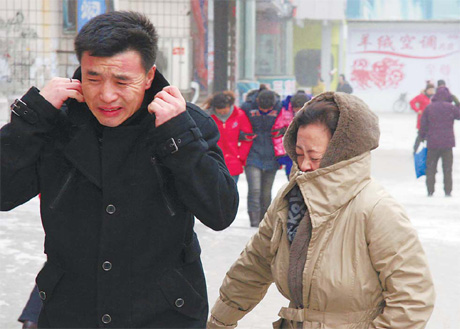Society
Cold wave numbs North China, relief efforts intensified
By Wang Qian and Cheng Yingqi (China Daily)
Updated: 2009-12-26 08:34
 |
Large Medium Small |
|
 Though used to sub-zero temperatures, people in Dandong, Liaoning province, still struggle to come to terms with the sudden drop in temperature on Friday. [China Daily] |
The coldest day of the season in Beijing could have frozen Mao Lijun to death. But the 30-something man luckily turned to police for help who directed him to Dongcheng relief center early on Friday morning.
His body temperature had dropped below 30 C, said Wu Shenshen, a worker at the center. What could have made matters worse for Mao was the strong wind that lashed the capital from Thursday evening to Friday morning.
If homeless people like Mao cannot withstand the cold in the open, one can imagine what the condition of the elderly and homeless would be, an official said.
Relief work started in full swing in 20 relief centers of Beijing, as well as other cities and towns in the northern part of the country on Thursday.
The next 10 days will see cold air move from the north to the south of the country, bringing rain and snow and causing the temperature to drop by up to 35 C, Sun Jun, chief forecaster of the National Meteorological Center, told China Daily on Friday.
The lowest recorded temperature so far has been - 40.2 in Qinghe, Altai, in the northern part of the Xinjiang Uygur autonomous region on Thursday night.
Zhang Handong, Altai Party chief, told China Daily on Friday that the regional government had allocated 9 million yuan ($132,000) to help people combat the cold.
Beijing started a three-day campaign on Thursday to provide shelter, warm clothes and food to the homeless, local authorities said.
Beijing's relief centers had received 46 homeless people by Friday, according to the city's bureau of civil affairs. Sixteen of the 20 centers provide accommodation to the homeless, said Wang Changlun, director of the Beijing relief management center.
"We're making great efforts to intensify our inspections, and are distributing cotton quilts and cotton-padded coats among the homeless," Wu said.
Wu and his colleagues will do the rounds of streets in and around busy areas such as Wangfujing, Beijing railway station and Tian'anmen Square, and offer water, food and blankets to the homeless and vagrants.
But more has to be done for people like Mao, Wu said. Though Mao feels much better after having a meal and enjoying the warm temperature inside the center, he still doesn't know what to do or where to go.
He left his hometown in Xinjiang two weeks ago to find a decent job in the capital, but even an ordinary meal became a dream for him after he lost his wallet at the Beijing railway station on Dec 15 and couldn't find a job.
He had been wandering the streets of the city since then, and to survive the cold, he kept walking all the time.
"Every night I walked around aimlessly to keep my body warm. During the afternoon I lay on roadside benches to take a nap in the winter sun," Mao said.
Home is the only thing he dreams about now. And he could return home in relative comfort because according to regulations, the relief center should help him with his travel expenses.
Mao is among the 152 homeless people who have got help from Beijing's relief centers between Dec 21 and 24. The centers have helped more than 17,000 homeless people in one way or the other, according to figures from the Beijing bureau of civil affairs.
"We can accommodate a lot of people and we are ready for colder weather," Wang said.
Shanghai authorities, too, have asked their relief centers to prepare for the coming cold front in order to help the homeless, said Zhou Zheng, head of Shanghai relief management center.
"Relief center workers will check out the streets to look for homeless people instead of waiting for them to come to us as we used to do before," Zhou said. The centers have already stocked a large amount of food and bundles of clothes and blankets.
Nanjing, capital of Jiangsu province, is the only city where a person has died of cold. He was a migrant worker from another part of the province.
The cold weather has disrupted road and air traffic, too. Liaoning province had to close 14 of its 15 highways on Friday after heavy snowfall overnight. The meteorological station in the provincial capital of Shenyang issued a warning on Friday morning for another snowstorm, and forecast that temperatures could drop to -24 C on Saturday.
The Taoxian International Airport in Shenyang cancelled many flights on Friday because snow on the runway had made landing and take-off difficult.
Cui Jia, Gao Changxin and Wu Yiyao contributed to the story











